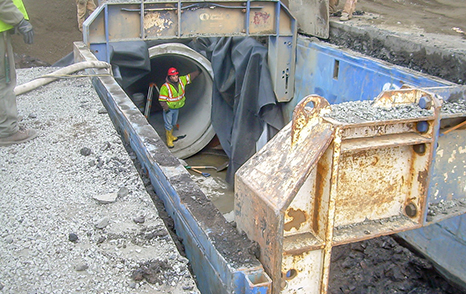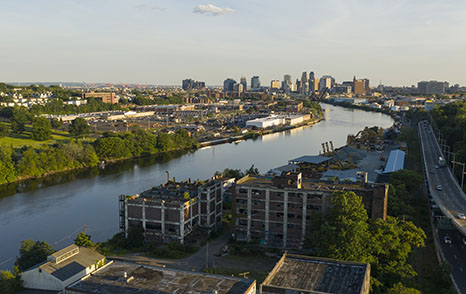
Combined Sewer Overflow
Combined sewer systems are shared underground pipe networks that direct both wastewater and stormwater to a Sewage Treatment Plant (STP). Under normal conditions, all the wastewater and stormwater are transported to a STP for treatment. During rainfall events or snowmelt, the additional volume of water can overwhelm the capacity of the pipe network and cause a Combined Sewer Overflow (CSO) outfall to discharge to the surface water.
The 2015 Final NJPDES Combined Sewer Overflow permits required submission of Long Term Control Plans to address combined sewer outfall discharges. These LTCPs were submitted in 2020 and reviewed by DWQ. Draft CSO permits have been issued based on the information contained in the LTCPs, input from stakeholders and comments from the DWQ. Final CSO permits have begun being issued based on the draft permits and written and oral comments submitted. Note that any new final permits that have been issued do replace the 2015 permits and have been included in the “Individual NJPDES CSO Permits” link below under “CSO Permittees”.
The goal of the CSO permits is to meet the requirements of the Clean Water Act and the National CSO Policy by reducing or eliminating the remaining CSO discharges in New Jersey. The Department is committed to working with Combined Sewer Overflow (CSO) permittees and CSO communities to reduce or eliminate CSOs by providing low-cost funding and guidance to meet permit obligations. In order to achieve the reduction or elimination of CSO discharges, CSO permittees will need to reduce flooding, ensure proper operation, maintenance and management of existing infrastructure and provide opportunities for green infrastructure. CSO permits reinforce the importance of properly operated and maintained water infrastructure systems in protecting public health and the environment and supporting economic redevelopment.
Twenty-five (25) individual CSO permits, covering 21 municipalities and effective on July 1, 2015, encourage permittee and community engagement on the planning and development of projects. CSO projects provide urban redevelopment opportunities, improve water quality, beautify neighborhoods, and improve the overall quality of life in our urban communities.
A major emphasis of the 2015 permit process was the development of regional strategies to reduce the amount of storm water that flows into combined sewer systems, through the development and implementation of a Long Term Control Plan. These LTCPs are now being incorporated into the next round of NJPDES CSO permits.

CSOs in New Jersey (NJ)
There are CSO outfalls in 21 New Jersey municipalities. The NJDEP has issued NJPDES permits to the owners/operators of combined sewer systems and/or CSO outfalls.

CSO Permittees
The owners/operators of CSO outfalls are regulated by NJPDES CSO permits. The goal of the NJPDES CSO permits is to meet the requirements of the Clean Water Act and the Federal CSO Policy.

CSO Long Term Control Plans (LTCPs)
The NJPDES CSO permits required that a range of CSO control alternatives be evaluated to reduce or eliminate discharges from CSO outfalls. The selection and implementation of these alternatives were submitted as part of the CSO LTCPs.

Public Engagement
Members of the community can assist NJPDES CSO permittees in addressing the CSO outfalls in NJ. The NJPDES CSO permits require active public outreach and engagement during the construction of the CSO LTCP projects.

CSO LTCP Financing
The New Jersey Water Bank (NJWB) is a partnership between the NJDEP and the New Jersey Environmental Infrastructure Bank (I-Bank) to provide low-cost financing for the design, construction, and implementation of water infrastructure projects that protect, maintain, and improve water quality. Projects eligible for financing include gray and green CSO LTCP projects.